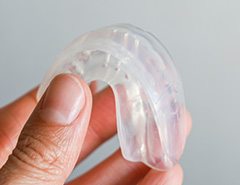
Dental Implants – Newark, DE
Replace Missing Teeth for Life

Have you been struggling for far too long with an incomplete smile? This kind of loss can be devastating for not only your appearance, but your oral health, your ability to enjoy your favorite foods, and your overall sense of self-esteem. At White Clay Dental Associates, our team would like to introduce you to a state-of-the-art solution: dental implants in Newark, DE. Dental implants succeed where more conventional tooth replacement services fall short because they replicate the entire natural structure of the original tooth, not just the white crown that sits on top of the gum tissue. To learn more or schedule a consultation with Dr. Bond and Dr. Ganfield, we invite you to contact our team today!
Why Choose White Clay Dental Associates for Dental Implants?
- Partnered with Delaware’s Best Oral Surgeons & Periodontists
- Advanced Dental Technology for Superior Treatment Planning
- Experienced, Compassionate Dentists with Your Best Interests at Heart
What Are Dental Implants?

A dental implant is a small titanium post that is placed beneath the gum line in a minimally invasive surgery. Over a period of several months, the implant fuses to the bone tissue around it in a process known as osseointegration, thus enabling it to act as a substitute tooth root. Eventually, we place a custom crown, bridge, or denture on top of the implant to replace the visible portion of the missing teeth. Once the dental implant treatment is complete, your new teeth should be indistinguishable from your real ones in practically every way!
The 4-Step Dental Implant Process

The process of creating your new smile starts with a consultation in our office, where we’ll work together to determine your smile goals and whether dental implants are the right treatment for you. Next, we’ll discuss every step of the treatment, including any preliminary procedures you may need, the implant placement surgery, and how we’re going to restore your implant. Overall, you can expect your dental implant journey to last from several months to a year. However, you can also expect to have a beautiful, sturdy smile that can last for decades to come.
We’ll discuss the details of your treatment during your initial appointment, but for now, here are the four basic steps of the dental implant process:
Initial Dental Implant Consultation

Your journey to your brand-new smile begins with a consultation with your dentist in Newark, either Dr. Ganfield or Dr. Bond. As a rule of thumb, if you have adequate oral and general health, you’ll be a good candidate for dental implants. However, there may be certain lifestyle factors and health conditions that could put you at risk for implant failure, such as habits and disorders that hinder your body’s ability to heal or fight off infections.
At your consultation, we’ll thoroughly examine your oral structures and take detailed x-rays of your mouth. This allows us to determine whether you’ll need any preliminary procedures, like a sinus lift or a bone graft, before your implants can be placed. These images also let us pinpoint precisely where your implants will be placed.
Dental Implant Surgery

For your implant placement, we’ll refer you to a specialist you can trust. They’ll surgically place however many implants you’re receiving into your jawbone. These titanium posts are completely biocompatible, meaning they’re practically guaranteed to be well-accepted by your body.
During the surgery, you’ll receive plenty of local anesthetic and perhaps even sedation to ensure your comfort. The oral surgeon will drill tiny holes into your jawbone where each post will be inserted. After your gum tissue is closed up, your body will then begin the truly remarkable process of osseointegration.
Dental Implant Osseointegration/Abutment

The implant posts stimulate your jawbone to grow around them until the two essentially become one structure. This process is known as osseointegration, and it’s what allows dental implants to be the most successful form of tooth replacement. Although this process can take several weeks to a few months, it’s well worth it to create a stable foundation for your new prosthetic teeth.
After your jawbone has fully recovered, you’ll undergo a second minor surgery where you’ll receive an abutment on each of your implant posts. An abutment is a metal attachment that connects your implant to your new prosthesis.
Delivery of Dental Implant Restorations

Once your mouth has thoroughly healed from abutment placement, you’ll return to our office. We’ll take impressions of your mouth and send them to our dental lab, where they will carefully craft your restoration, whether it’s a crown, bridge, or denture. The result will be a beautiful, long-lasting smile you can be proud of.
Benefits of Dental Implants

Dental implants have become one of the most popular methods of tooth replacement, with over 500,000 being placed every year. They rebuild every single part of the natural tooth, including the root beneath the gums. This comprehensive approach preserves a patient’s jawbone and helps them maintain excellent oral health for longer. Because of their unique placement inside the jawbone, implants provide a range of incredible benefits that you simply can’t get with traditional options like dentures and dental bridges!
Day-to-Day Benefits

Many denture wearers claim that their prosthetic limits their ability to live life to the fullest. Well, dental implants can change that. Since they’re so similar to natural teeth, you can expect to reap several incredible benefits, including:
- Regained ability to eat most foods. Dental implants replace the entire structure of a missing tooth, meaning they’re able to withstand the chewing power of virtually any food.
- Increased confidence. Because implants are carefully designed to complement your natural facial structure, they’ll allow you to smile with confidence.
- Lower maintenance. You don’t have to worry about incorporating complex steps into your oral hygiene routine. All you have to do care is for your new smile as you would care for natural teeth!
Health Benefits

With dental implants, you can enjoy more benefits beyond improving your daily quality of life. Here are a few significant health advantages they offer as well:
- Jawbone preservation. Since dental implants are surgically inserted into the jawbone, they stimulate it to prevent the bone loss that’s common after tooth loss. They also help maintain the face’s overall shape.
- Protection for remaining teeth. It’s common for teeth to shift after tooth loss because there’s nothing to keep them in place. Luckily, implants serve as a placeholder to ensure every member of your smile stays exactly where it belongs.
- Improved overall health. Studies have revealed a correlation between tooth loss and an increased risk of multiple diseases. Because implants are so similar to natural teeth, it’s safe to assume that they can help lower such risks.
Long-Term Benefits

You can expect to reap multiple long-term benefits with dental implants, including:
- High success rate. Dental implants have an impressive success rate of about 95 percent even 20 years after they’ve been placed.
- Youthful appearance. The implant post stimulates blood flow in the jaw, preventing deterioration and the sunken, aged look that often comes with tooth loss.
- Long lifespan. With proper care and maintenance, implants can last for decades – sometimes even a lifetime!
Who Dental Implants Can Help

Tooth loss can occur across a wide spectrum, and our team will be happy to help you determine how to best rebuild your complete, confident smile with the support of modern dental implants and custom-made restorations. Take a look below to learn more:
Missing One Tooth

If only one tooth needs to be rebuilt by our team, pairing a single implant with an all-porcelain crown will likely be the best way to go about it. Unlike a traditional bridge, the crown won’t threaten the health of the surrounding natural teeth, and the finished result will be so seamlessly lifelike that those around you likely won’t even be able to point out the new addition!
Missing Multiple Teeth

While implant-supported crowns can also be successfully used to restore several missing teeth throughout the mouth, our team may recommend an alternative if a multi-tooth gap needs to be filled in: an implant-supported dental bridge. Two implants will be placed on either side of this gap to serve as “anchors” that hold the new restoration sturdily in place. As a result, the biting strength is restored, and nearby healthy teeth are no longer able to drift out of their positions.
Missing All Teeth

Contrary to popular belief, many patients missing most or all of their natural teeth can be great candidates for dental implants. Instead of replacing every single missing tooth with its own individual implant (a process that can quickly become very expensive), our dentists will recommend an implant denture that attaches to a small number of strategically angled implants throughout the mouth. This type of denture can be permanently fixed in place or kept removable if a patient is already used to wearing a traditional prosthetic.
Understanding the Cost of Dental Implants

When considering dental implants as a viable tooth replacement, cost is an understandable concern. However, it’s important to keep in mind that every patient’s needs are different – that’s why our dentists at White Clay Dental Associates will need to perform a dedicated implant consultation before they can provide a confident price estimate for your particular situation. They will consider the types of restorations needed, the placement of abutments (connectors), if any health-minded procedures like periodontal therapy are required before treatment begins, and so on.
Rest assured that dental implants are designed to stand the test of time, providing unparalleled durability, aesthetic value, and longevity. Simply put, they are an investment worth making!
Types of Dental Implants

No matter the number of teeth you have missing, it’s important to have them replaced. That’s because any absence, over time, can lead to the troublesome shifting of the other teeth. Some of the results of this can be a poor bite, difficulty performing oral hygiene and a greater chance of developing a gum infection.
When you visit us for an initial examination, Dr. Ganfield will work with you to determine which dental implants in Newark are best suited for your needs. Here are your options:
- Traditional Dental Implants – This is used when there is only one tooth missing, and the full fixture consists of the post and abutment (anchor), which are both constructed from durable titanium. The final piece is the porcelain crown that leaves the tooth fully restored.
- Implant-Retained Bridge – For situations where two or more teeth are missing, an implant-retained bridge is a viable option. The replacement crown fixtures are attached to a single apparatus, and it is securely affixed to the abutment.
- Mini Dental Implants – For a less invasive form of replacement, there are mini dental implants. They are attached beneath the gum line like traditional implants; they’re just smaller. This is especially an option to consider for patients who are more cost-sensitive.
- All-on-4 Dental Implants – If you’re missing an entire set of teeth, Dr. Ganfield offers the All-on-4 method for implant placement. Instead of placing a dental implant for each missing tooth, he’ll instead insert four strategically positioned implants along the upper and lower gums. They will attach to a set of custom-designed dentures that securely snap into position.
What Are the Stages of Dental Implant Treatment?

One of the more attractive features of affordable dental implants in Newark is that after the 10-year mark, the average success rate is 95 to 98 percent. This is greatly attributed to the careful and conservative approach Dr. Ganfield takes to performing each step of the procedure.
Before any work commences, he’ll conduct a thorough examination. The condition of your overall health, the number of teeth you have missing, the amount of healthy bone mass that remains and whether you’ll need a bone grafting procedure, will all be considered.
Then, once you’re cleared to undergo the procedure, the first step will be to attach the implant to the jawbone. Then, you’ll be allowed time to heal, and we’ll provide you with instructions on how to encourage the process. Later, we’ll invite you back to our Newark office to have the abutment placed so the final restoration can be securely added.
With your smile fully restored, you can get back to leading the type of life you want!
Are Dental Implants Worth the Investment?

To assess the value of the dental implant procedure, you have to determine how important your happiness is to you. Then, take into consideration the fact that no other form of tooth replacement offers the functionality, aesthetic appeal, and longevity of the dental implant process.
It’s also a big plus that, with proper care, a dental implant can last 20 years or more. Therefore, if you’re careful to practice excellent oral hygiene, which includes brushing and flossing on a regular basis, and you maintain regular visits with your dentist in Newark for preventive care, you’ll definitely see an excellent return on your investment.
Does My Dental Insurance Cover Dental Implants?

The best way to determine whether your dental insurance will cover your dental implant placement is to review your individual coverage. Typically, though, if benefits are provided, it will be for any restorative care that may be needed pre-surgery or for a final prosthetic. Thus, you’d be responsible for the implant placement.
We have partnered with CareCredit for situations such as these, so you don’t have to miss out on the vital care you need. As a form of low-to-no-interest financing, it allows you to undergo care and pay the balance over a six-to-24-month time period.
Maintaining & Caring for Your Dental Implants

After investing both your valuable time and money into the dental implant process, the last thing you want is for yours to come loose, crack, or “fail” in another way. The best way to prevent that from happening is by committing to good oral hygiene habits and leaving any bad ones that exist in the past. More specifically, our Newark dental team recommends the following:
Make Oral Hygiene a Priority

You may have heard of peri-implantitis, but did you know it’s one of the leading causes of tooth decay? That’s why it’s crucial that you commit to good oral hygiene habits at home, like brushing twice a day with a soft-bristled toothbrush and fluoridated toothpaste. Make sure that you floss and rinse with mouthwash consistently as well; this will go a long way in preventing plaque buildup, keeping your gums healthy, and avoiding bad breath.
Eat a Healthy Diet

Remember, what you eat impacts your oral health and, in turn, the condition of your dental implants. For this reason, we don’t recommend eating sticky, crunchy, or sugary foods, like caramel-filled candies, popcorn, and peanut brittle. Instead, we encourage our patients to eat plain yogurt, scrambled eggs, oatmeal, cooked broccoli, and other foods that are softer in consistency and filled with nutrients.
Bonus tip: Make water your go-to drink! It will help keep you hydrated and prevent dry mouth.
Break Bad Habits

Although it may not seem like it, “harmless” habits, like biting your nails or chewing on ice cubes, aren’t so harmless. Quite the opposite; it’s only a matter of time until your restoration gives under the pressure. That’s why we strongly recommend breaking bad habits like these. If you haven’t already, you should also quit using tobacco products since they can lead to several serious consequences, including delayed healing.
Protect Your Dental Implants

Do you often wake up in the morning with a headache? Do your teeth feel sore and sensitive in the morning? Are there multiple, small cracks in your enamel? If you answered “yes” to any of these questions, then you may grind or clench your teeth at night. To protect your teeth and dental implants from lasting harm, we recommend scheduling an appointment with us so we can have a custom nightguard made.
Schedule Regular Dental Checkups

Lastly, you need to schedule a dental checkup and teeth cleaning at our office every six months – even if you don’t have any of your natural teeth left! These routine visits are crucial because they ensure that we catch gum disease, oral cancer, and other serious health problems early on. Plus, it’s possible for plaque and tartar to build up, even if you consistently brush and floss at home. So, we need to conduct a thorough cleaning every six months to ensure your teeth, your gums, and your dental implants stay in pristine condition.
Dental Implant FAQs

Even after reading all about dental implants, you likely still have some questions. After all, implants are a huge investment, and you’ll want to be as prepared as possible before beginning treatment. That’s why we have assembled some of the dental implant questions that we get asked the most frequently and answered them for you below. If you have a dental implant question that you don’t see answered here, feel free to contact us and ask away.
Can I still get dental implants if I smoke?
Yes, but there is a higher risk of your body rejecting the implant. The success of your dental implants in Newark depends on your jawbone’s ability to grow around the implant post. Smoking or chewing tobacco slows down the oral healing processes, making your implants more likely to fail. If you have been looking for a reason to quit smoking, getting dental implants would be it. If you’re having trouble quitting, ask one of our dentists for resources. We are here to help you.
What can cause a dental implant to fail?
Many factors besides smoking can result in implant failure, such as the implant not being placed correctly and the site being unable to heal. The other main reason is infection. If you have infections in your bones or soft tissue, such as gum disease, it’s imperative that you get those dealt with before starting your treatment, to ensure the success of your implants.
Why do I need a bone graft before getting dental implants?
The longer you have been missing teeth in Newark, the more likely your jawbone will start to deteriorate due to lack of stimulation from your natural tooth roots. The amount of jawbone mass you have is a crucial factor in the success of your dental implants. If you don’t have much jawbone mass left, your implant is very likely to fail due to not having enough support. A bone graft involves grafting artificial bone material onto your jawbone and allowing it to heal for a few months before your implant procedure can begin. Afterwards, your jawbone should have more than enough strength to support your implants.
How Long Do Dental Implants Last?
Dental implants are designed to easily last for several decades. If you maintain them properly with regular brushing, flossing, and checkups and cleanings, they can even last for the rest of your life. So, although implants might seem like an expensive option up front, keep in mind that they are the only solution to tooth loss that can last for this long without needing to be replaced.
Does Getting Dental Implants Hurt?
Most patients report only minimal discomfort during the implant placement procedure. Afterwards, you can expect some soreness, as with any type of oral surgery. This can usually be managed with over-the-counter pain relievers. Your oral surgeon might also prescribe some more powerful painkillers, depending on how complex your case is. Just remember to only take them as directed on the bottle.